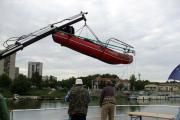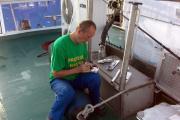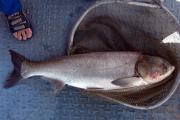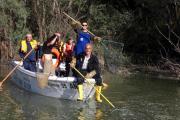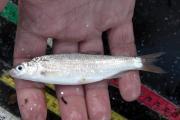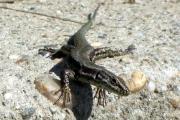
On the 16th, during sampling near the Iskar River, black smoke came suddenly from the end of the boat's electric boom used for electro-fishing. Before the team could react, burning glass fibres had torn. Most likely, the cable inside was damaged from several weeks of daily toil and finally ignited. Soon after switching to the hand-held electro-fisher, sampling again had to be stopped because the electric current failed to work. As a result, instead of sampling, the team spent the afternoon on repairs to make sure they could do night sampling on schedule nearby at the Danube's confluence with the Olt River.
The morning of the 17th was highlighted by a large log drifting downstream that "anchored" onto the Argus. The captain of the Fish Team's boat, the Piscius, tried to help remove it with his ship, but unfortunately misjudged the difficulty of the task and got his own ship stuck as well. Combined forces on the two ships eventually dislodged the log, and the ships were free again. After fishing with the Romanian National Team, night fishing led to Grigore Davideanu receiving a painful sting by a hornet that had been accidentally caught, and enough material for fish tissue sampling.
"The next day, the team's spirits started as low as the water level was high," says Wiesner. The first discovery was that the hand-held electro-fisher was broken. So only the electric boom could be used which is very inefficient at high water levels, and when banks are steep and trees extend far into the water surface. The poor catch poor didn't improve the mood. But heading to Ruse, they made their biggest catch so far - an 86 cm bighead carp (Hypophthalmichthys molitrix), a species introduced from East Asia.
On the 20th near Ruse, low air pressure in the front chamber of the zodiac while fishing confirmed that there must be a hole somewhere in the small rubber boat. After an uneasy voyage to the next stop at Oltanita, the zodiac was lifted from the water by the Argus's crane onto the deck of the Szechenyi. A hole was found in an area worn out after the stormy weather a few days ago, and rain postponed the repair work until the next day. "During repairs on the 21st, the only things cheering us up were some street dogs running around and lizards enjoying the sun rays on hot stones," says Wiesner.
The successfully repaired boat was put to water again by the Argus crane on the 22nd, allowing for continued sampling, although fish catches remained low from the bottom of the still-too-deep Danube. Nonetheless, some juvenile nase (Chondrostoma nasus) reminded the team that the Danube is still a free-flowing river in this area. On the way to Braila, team members started to worry if the selection of the sampling sites had been optimal. "It seems that accessibility has priority to river typology," says Wiesner.












